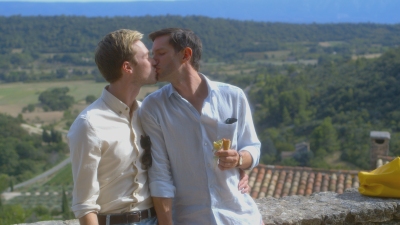
I love symbolism in films: imagery that represents feelings, thoughts, doubts, desires… Wasp achieves this simply but effectively in a piece that is relatable as well as probing. New writer-director Philippe Audi-Dor and producer Merlin Merton bring together fresh faced actors Simon Haycock, Elly Condron and Hugo Bolton in this film that explores both sexuality and relationships, and tests the faith one pressumes from monogamy and self-control.
Caroline (Condron) has just been dumped after a three-year-long relationship and has agreed to tag along to James (Bolton) and Oliver’s (Haycock) romantic getaway to the south of France to take her mind off of things. My eyes narrow cynically at this point – definitely a mine field asking to be tripped. This equation: a couple on an escape, added to an idyllic and secluded haven, divided by a wounded and emotional female, equals something not good down the line.
Bad seeds are planted early on in Caroline and Oliver through wandering eyes and lingering looks, and in questions asked that you only really think in your head and not say out loud. The sexual tension here is tangible and thick, but the romance between James and Oliver however, I personally didn’t feel as convincing. Nonetheless, kudos to Audi-Dor for acknowledging we are familiar with such primal human acts, cleverly playing on the fact that we are naturally guilty of these. Alongside his use of imagery, this visible consciousness in the film is what impressed me most; the ability to understand these little gestures, ripe with meaning and insinuation, and be able to project that so naturally on screen. A nod of course must be given to the actors, of which Condron stirred me the most with her Eve-slash-Jezebelle type character.
However it isn’t just Caroline’s brazen behaviour that is the source of fanning the fire here; it is uncovered that Oliver previously dated a woman, suggesting he may still be bisexual. He waivers in his confidence with his current relationship, perhaps is even swayed by Caroline, and his animal instincts are tested and confused by her. His defensive attitude towards those uncomfortable questions is clear testament of underlying issues undealt with. As they say, where there is smoke…
A particularly poigniant scene, and my favourite one too, was the reactive coition between James and Oliver that cuts between another scene of springs flexing on the trampoline Caroline was jumping on. Oliver is thinking of her, desperately trying to supress the invasive thoughts of her. This bowing and retracting appropriately represents his feelings and the feelings of all three of the characters, within themselves and with each other, in their doubts and in their certainties (or lack of).
The second half of the film got well into its stride, building the tension and the drama with games that we may be familiar with (how many have you played ‘Never have I ever…’?) and innocent discussions that lead to inebriated arguments. Some details though could have been introduced earlier on for contextual purposes like revealing how long Caroline had been in her ended relationship. This for me could have explained the degree of her gutsiness to be so prying and rebellious, instead of leading me to believe she was just plain being a bitch.
Again though, the film does well in its arousal of feelings. Tension was felt when tension was intended. When Caroline wanders around in the dark, we expect it to be her sneaking out. When James’s paranoia escalates and he bursts in to his bedroom, we expect him to find something unsavoury. Although these are mind games acted out on screen, these are very much real in the way we actually do think, and this is an important achievement by Audi-Dor.
I thoroughly enjoyed this film; it’s one of those ones that creates a buzz about it, imploring you to talk about all the emotions you felt and the juiciness of the drama. It’s brave and clever, and doesn’t try to be Hollywood. Wasp asks a lot of questions in the absence of words – ‘what happened in the car?’, ‘what happened in the bedroom?’, ‘what happened after the slap?’ – and even the ones posed with, push the boundaries of what answers we think we have for them. Director of Photography on the film, Pablo Rojo, does an excellent job of leading our eyes when those looks last longer than normal and those stolen glances that mean so much more. In fact, all the cast and crew appear to do an excellent job well done.
My final note on it is this: the common misconception of the wasp is that once it stings, it dies. It does not – it goes on to sting again. In the close, we see one die and it must do from no other reason than suffocation. It is left behind in the empty house, walls primed with bitterness.
3.5 out of 5
JM
Wasp is out to watch in March, date TBC.


Nice review, sounds like an intriguing film
Thanks @winterfell7. I will update the confirmed release date when I know so you can watch it and review for yourself 🙂